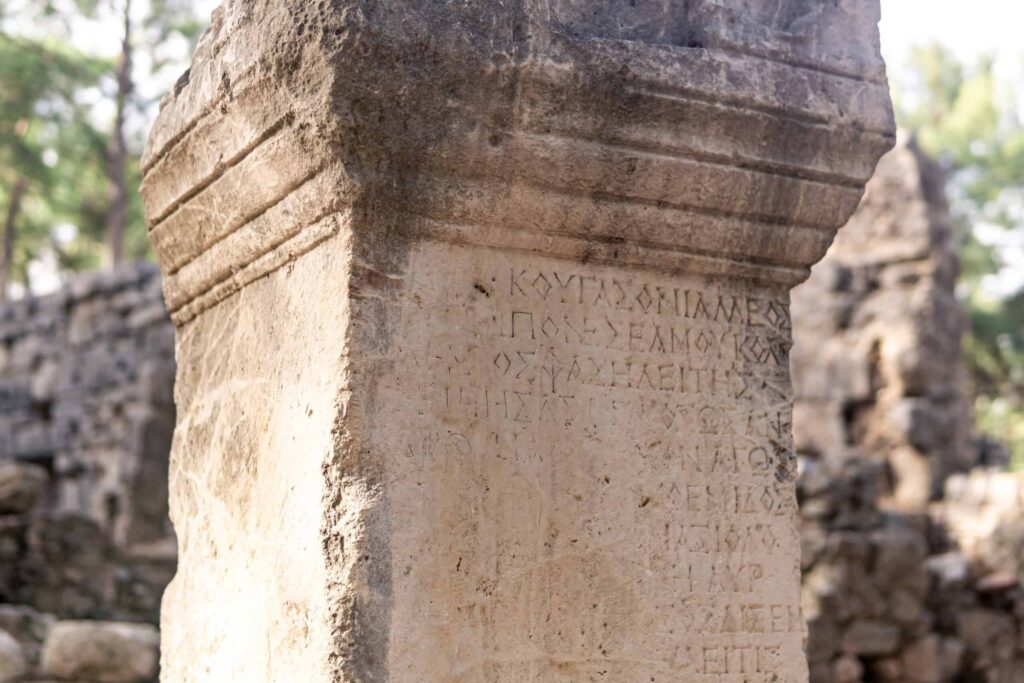Curious about the language spoken in Greece? Prepare for a linguistic journey that will unveil the stark contrast between the official language of Greece and other widely spoken languages worldwide. Dive into the unique characteristics, rich history, and cultural significance of this language, offering insights into the country’s heritage and identity. Discover how this language bridges the past with the present, shaping interactions, traditions, and everyday life in Greece.
Key Takeaways
- Embrace Greek: The official language of Greece is Greek, so learning the language can enhance your cultural experience and interactions while visiting or living in Greece.
- Diverse Dialects: Understand the regional dialects in Greece to appreciate the linguistic diversity within the country and connect more deeply with locals in different regions.
- Respect Minority Languages: Acknowledge the significance of minority languages in Greece to preserve cultural heritage and promote inclusivity within the diverse linguistic landscape.
- Explore Modern Variants: Explore the nuances of Modern Greek variants to grasp the evolution and adaptation of the language in contemporary contexts.
- Sign Language Awareness: Recognize the importance of Greek Sign Language as a means of communication for the Deaf community in Greece, fostering inclusivity and accessibility.
- Cultural Richness: Delve into the cultural impact of languages in Greece to appreciate how linguistic diversity contributes to the country’s rich heritage and traditions.
Official Language of Greece
Significance
Greek holds a crucial place as the official language of Greece, reflecting the country’s rich cultural heritage and historical importance. It serves as a symbol of national identity and unity, connecting Greeks across generations.
Modern Greek Prevalence
The majority of Greeks communicate in Modern Greek, making it the primary language spoken in everyday life, business transactions, and social interactions. This linguistic continuity highlights the enduring legacy of the Greek language.
Role in Official Communications
Standard Modern Greek plays a pivotal role in official communications within Greece. It is utilized in government proceedings, legal documents, educational materials, and media broadcasts to ensure clarity and consistency in information dissemination.
Regional Dialects Overview
Cretan Greek
Cretan Greek, spoken on the island of Crete, stands out for its distinctiveness. The dialect features unique linguistic elements that differentiate it from standard Greek. One notable characteristic is the preservation of archaic words and expressions.
The pros and cons of Cretan Greek include:
- Pros:
- Rich cultural heritage
- Strong sense of community identity
- Cons:
- Limited mutual intelligibility with standard Greek
Pontic Greek
Originating from the region around the Black Sea, Pontic Greek holds a significant place in Greece’s linguistic landscape. Despite facing challenges over the years, this dialect continues to be spoken by a small but resilient community.
Key information about Pontic Greek:
- Historical Roots:
- Traces back to ancient Greek settlements in Asia Minor
- Influenced by languages like Turkish and Armenian
- Current Usage:
- Primarily spoken in northern Greece
- Efforts to preserve and revitalize the language ongoing
Minority Languages Insight
Cultural Diversity
Greece, known for its historical significance, also boasts a rich linguistic diversity. Apart from the dominant Greek language, several minority languages are spoken across the country. These languages contribute to the cultural tapestry of Greece, reflecting its multicultural heritage.
Albanian Presence
Albanian, one of the most prominent minority languages in Greece, is spoken by a significant population, especially in regions bordering Albania. The presence of Albanian speakers highlights the close ties and historical connections between Greece and Albania.
Turkish Influence
Another notable minority language in Greece is Turkish. With roots deep in history, Turkish speakers in Greece bring forth a unique blend of cultural traditions and linguistic nuances. This presence underscores the intricate interplay between different communities within the country.
Armenian Heritage
Armenian, although spoken by a smaller community compared to Albanian and Turkish speakers, holds great cultural significance in Greece. The Armenian language reflects a rich heritage and adds to the diverse linguistic landscape of the country.
Census Data
According to recent census data, these minority languages play a crucial role in shaping the sociolinguistic dynamics of Greece. The inclusion of such languages in official records highlights the importance given to preserving linguistic diversity within the nation.
Modern Greek Variants
Maniot Greek
Maniot Greek is a unique variant of the Modern Greek language spoken in the Mani Peninsula of the Peloponnese. This dialect is known for its archaic features, preserving elements from ancient Greek. The Maniots have maintained their distinct language as a symbol of cultural identity.
Thracian Greek
Thracian Greek is a dialect spoken in Western Thrace, an area bordering Bulgaria and Turkey. This variant showcases influences from neighboring languages due to the region’s historical context. The use of Thracian Greek reflects the diverse linguistic landscape in Greece.
Greek Sign Language Understanding
Importance
Greek Sign Language (GSL) plays a crucial role in facilitating communication for the deaf community in Greece. It serves as their primary mode of expressing thoughts, emotions, and ideas.
GSL is essential for ensuring inclusive communication, allowing deaf individuals to interact effectively with both other members of the deaf community and those who understand sign language.
Unique Features
The unique features of GSL lie in its visual-gestural nature, distinct grammar rules, and facial expressions that convey nuanced meanings.
- GSL uses handshapes, movements, and orientations to represent words, concepts, and emotions.
- Facial expressions are integral in conveying tone, intensity, and context within GSL conversations.
Impact on Deaf Community
The adoption of GSL has had a profound impact on the deaf community in Greece by fostering a sense of belonging and empowerment.
- GSL enables deaf individuals to participate actively in various aspects of society, including education, employment, and social interactions.
- It enhances accessibility to information and services for the deaf population, promoting their inclusion in mainstream activities.
Regional Languages in Detail
Cypriot Greek
Cypriot Greek, a distinct dialect of the Greek language, is primarily spoken in Cyprus. It differs from Standard Modern Greek in pronunciation, vocabulary, and grammar. Cypriot Greek has influences from ancient Greek, Byzantine Greek, and Turkish. This unique dialect is an essential part of Cypriot culture and identity.
Sarakatsanika
Sarakatsanika is a traditional variety of Greek spoken by the Sarakatsani people, nomadic shepherds with a rich cultural heritage. This language reflects their history of migration and close-knit community bonds. Sarakatsanika incorporates elements from various languages due to the Sarakatsani’s interactions with different groups over centuries.
Linguistic Landscape in Greece
The linguistic diversity in Greece goes beyond the official language of Modern Greek. Various regional languages are spoken across different regions. These languages often have historical significance and provide insights into the country’s cultural tapestry. The preservation of these regional languages is crucial for maintaining Greece’s linguistic heritage.
Minority Languages in Greece
Cultural Significance
Greece, known for its rich cultural heritage, also boasts a diverse linguistic landscape beyond the official language of Greek. Minority languages play a crucial role in preserving the unique identities and histories of various communities across the country. These languages serve as a testament to Greece’s multicultural past and present, highlighting the coexistence of different ethnic groups within its borders.
Romani and Bulgarian Influence
In specific regions of Greece, such as Thrace and Macedonia, Romani and Bulgarian languages have left a significant mark on the local culture. The Romani language, spoken by the Roma community, reflects their distinct traditions and way of life. Similarly, the Bulgarian language’s influence can be observed in areas where Bulgarian minorities reside, showcasing the historical ties between Greece and Bulgaria.
Preservation Efforts
Efforts to preserve minority languages in Greece have gained momentum in recent years. Various organizations and educational institutions have been actively involved in initiatives aimed at safeguarding these languages from extinction. Bilingual education programs, cultural events, and language revitalization projects are some of the strategies being implemented to ensure that minority languages continue to thrive alongside Greek.
Cultural Impact of Languages
Diversity in Traditions
Languages spoken in Greece, including Greek, contribute significantly to the country’s rich cultural heritage. The diverse linguistic landscape in Greece reflects its historical interactions with various civilizations. This linguistic diversity has played a crucial role in shaping the unique traditions and customs observed across different regions of the country.
Preservation of Heritage
The presence of multiple languages in Greece serves as a testament to the nation’s commitment to preserving its cultural heritage. Minority languages, such as Turkish, Macedonian, and Albanian, are not just means of communication but also symbols of identity and historical continuity for specific communities within Greece.
Influence on Social Dynamics
The coexistence of different languages in Greece fosters a sense of inclusivity and mutual respect among its population. Multilingualism is celebrated as a reflection of the country’s openness to diverse cultures and traditions. This linguistic diversity enhances social cohesion by bridging gaps between various ethnic groups and promoting understanding among communities.
Importance in Education
In educational settings, the recognition and promotion of minority languages alongside Greek encourage linguistic diversity among students. Bilingual education programs not only help preserve these languages but also empower individuals to embrace their cultural roots while acquiring essential academic skills. Such initiatives contribute to fostering a more inclusive and tolerant society in Greece.
Economic Opportunities
The linguistic diversity present in Greece opens up new economic opportunities, particularly in sectors such as tourism and international trade. Proficiency in multiple languages allows individuals to engage with a broader range of visitors and business partners, enhancing cross-cultural communication and collaboration. This linguistic advantage positions Greece favorably on the global stage, attracting investments and promoting cultural exchange.
Summary
You now have a comprehensive understanding of the diverse linguistic landscape in Greece. From the official language to regional dialects, minority languages, and cultural impacts, you’ve delved into the rich tapestry of languages spoken in this country. By exploring Modern Greek variants, Greek Sign Language, and regional languages in detail, you’ve gained insights into the linguistic heritage that shapes Greek society.
To further enrich your knowledge and appreciation of languages, consider exploring language preservation efforts in Greece or learning a few basic phrases in Greek. Understanding the significance of languages within a cultural context can open doors to new connections and opportunities. Embrace the linguistic diversity around you and continue to expand your horizons through language exploration.
Frequently Asked Questions
What is the official language of Greece?
Greek is the official language of Greece. It is spoken by the majority of the population and holds significant cultural importance in the country.
Are there regional dialects spoken in Greece?
Yes, Greece has various regional dialects that differ from standard Greek. These dialects are influenced by historical, geographical, and cultural factors unique to each region.
What minority languages are spoken in Greece?
Apart from Greek, minority languages spoken in Greece include Turkish, Macedonian, Albanian, and others. These languages reflect the diverse cultural heritage present in different regions of Greece.
Is Greek Sign Language used in Greece?
Yes, Greek Sign Language is used by the deaf community in Greece. It has its own grammar and vocabulary and plays a crucial role in facilitating communication among individuals who are deaf or hard of hearing.
How do languages impact Greek culture?
Languages play a vital role in shaping Greek culture by preserving traditions, literature, and historical narratives. They also contribute to the rich tapestry of multiculturalism within the country.




